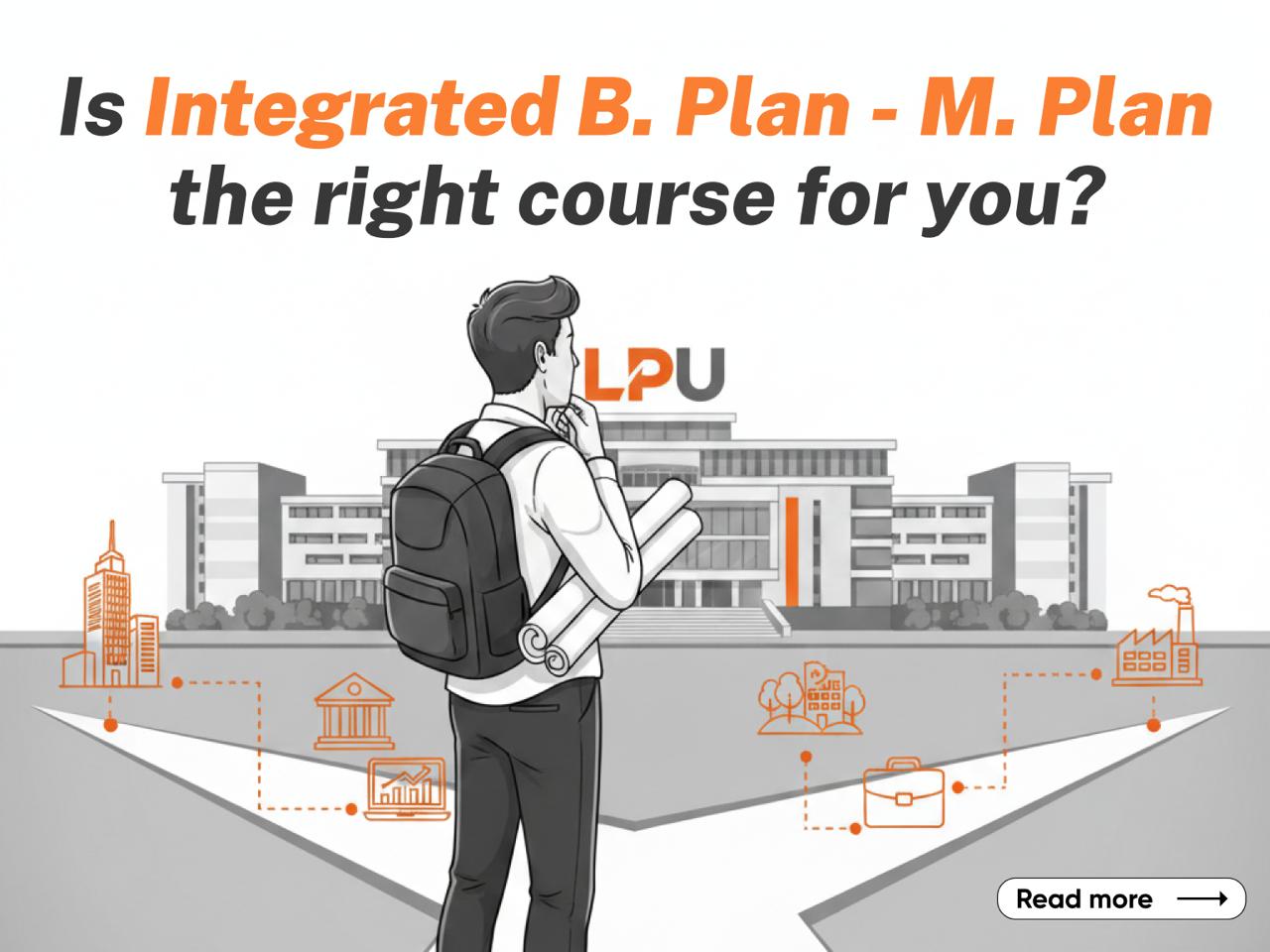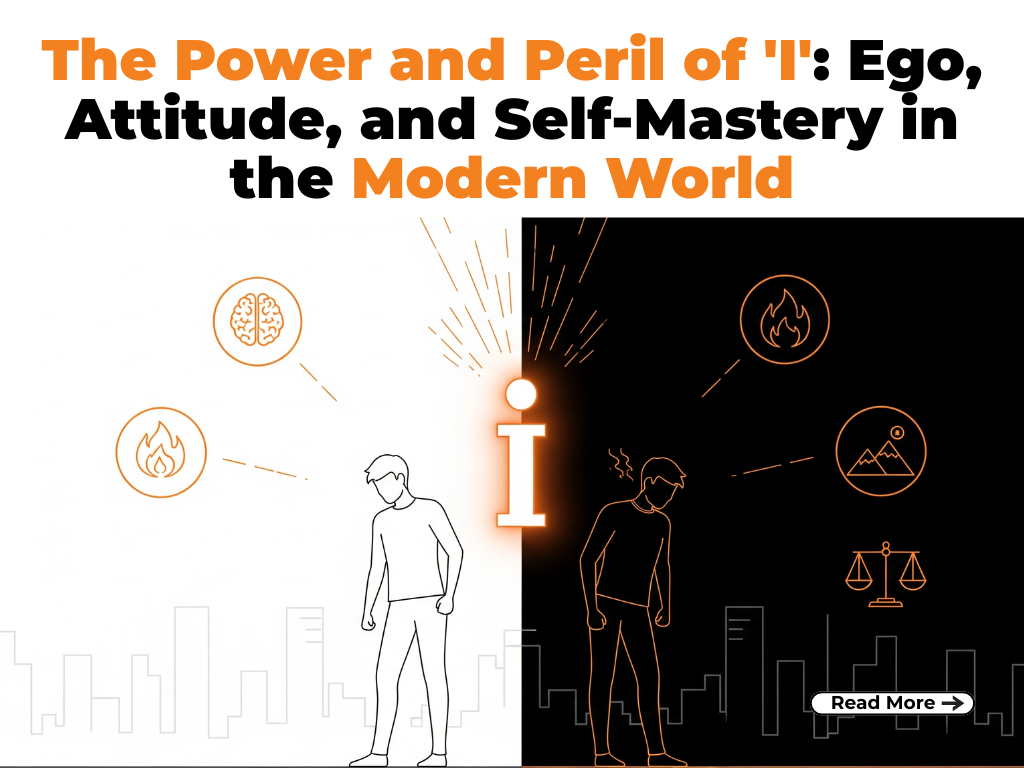- Why Choosing the Right Course Matters?
- What Is Integrated B. Plan – M. Plan?
- Who Should Consider Integrated B. Plan – M. Plan?
- Why Urban & Regional Planning Is a Game-Changer in Development?
- Top Skills You’ll Develop in Integrated B. Plan – M. Plan
- Future Scope in Urban Planning & Sustainable Development
- Internship & Live Project Opportunities
- Collaborations with Government Bodies & Urban Development Authorities
- Alumni Success Stories
- How to Maximize Your Career in Planning & Design?
- Higher Studies and Global Certifications After Integrated B. Plan – M. Plan
- Conclusion
- FAQs
Why Choosing the Right Course Matters?
Making an informed decision while choosing the right course is perhaps one of the most crucial steps in a student’s academic and professional journey. The programme you select today not only determines what you study for the next few years but also defines the type of career opportunities you will have in the future. Many students struggle because they pick courses without aligning them to their strengths, passion, or the demands of the industry. That is why careful guidance and awareness are essential.
For those passionate about shaping the future of cities and communities, a career in planning and design offers far more than just creating layouts or maps. It involves a holistic approach to designing cities that are inclusive, efficient, and environmentally sustainable. Planners work on real-world challenges such as affordable housing, traffic congestion, pollution control, and digital infrastructure. They are visionaries who ensure that development meets the needs of today without compromising the opportunities of tomorrow.
The importance of urban planning education has grown rapidly in recent decades. With the population shift towards urban areas, there is an urgent need for experts who can balance rapid growth with sustainable solutions. Globally, urban planners are at the center of smart city development, regional integration, and sustainable growth models. In India, this demand is particularly high as the country prepares for large-scale modernization.
| Did You Know? India’s Smart Cities Mission aims to develop more than 100 smart cities across the nation. This opens vast and diverse opportunities for professionals trained in planning, design, and sustainable urban development. |
What Is Integrated B. Plan – M. Plan?
The Integrated B. Plan – M. Plan course is an advanced academic programme that blends a Bachelor’s in Planning (B.Plan) and a Master’s in Planning (M.Plan) into one seamless study track. Instead of pursuing both degrees separately, students can complete this combined bachelor and master in planning in a more efficient and time-saving manner.
Key Features of the Integrated B. Plan – M. Plan:
| Aspect | Details |
| Degree Type | Combined bachelor and master in planning (dual qualification) |
| Duration | 5 years (saves 1 year compared to doing B. Plan and M. Plan separately) |
| Curriculum | Comprehensive coverage of urban planning degree fundamentals, regional and transport planning, GIS (Geographic Information Systems), housing, environmental planning, and sustainable development practices |
| Outcome | Students graduate with a dual qualification (Bachelor + Master), making them industry-ready for advanced planning roles |
The Integrated B. Plan – M. Plan course not only saves time but also ensures a holistic education in urban development. Students gain strong theoretical foundations, practical exposure, and research skills, equipping them to take on higher-level roles such as Urban Planner, Policy Analyst, Transport Planner, or GIS Specialist immediately after graduation.
This programme is ideal for aspirants who want a future-ready urban planning degree with deeper insights into sustainable city development, smart infrastructure, and regional growth strategies.
Why Choose the Integrated B. Plan – M. Plan Course?
- Time & Cost Efficiency – Complete both degrees in 5 years instead of 6, saving a year without compromising on depth of knowledge.
- Holistic Urban Planning Degree – Get comprehensive training in land use planning, infrastructure design, environmental sustainability, housing policy, and smart city development.
- Future-Ready Skills – Hands-on expertise in GIS, data-driven planning, transport systems, and sustainable development models, aligning with global urban challenges.
- Career Edge – Graduates can step directly into advanced professional roles such as Urban Planner, Regional Development Specialist, Policy Analyst, Transport Planner, or GIS Expert, or pursue higher research opportunities (like Ph.D. in Planning).
- Industry Demand – With rapid urbanization and the growth of smart cities in India and worldwide, there is a strong demand for qualified planning professionals who can balance development with sustainability.
Who Should Consider Integrated B. Plan – M. Plan?
The Integrated B. Plan – M. Plan is a rigorous and interdisciplinary programme that demands both creativity and analytical skills. It is not just for anyone it is designed for those with a genuine passion for shaping cities, regions, and communities. So, who should study planning and choose this specialized pathway?
Eligibility for B. Plan – M. Plan
To apply for the Integrated B. Plan – M. Plan course, students must meet the following eligibility for B. Plan – M. Plan criteria:
- 10+2 Qualification: Pass with 50% aggregate marks in 10+2 with English or equivalent examination.
- Diploma Pathway: Pass with 50% aggregate marks in a 3-year Diploma in Architecture, Civil Engineering, or Design (after 10th) or equivalent.
This ensures that students entering the programme already have a foundation in analytical reasoning, technical aptitude, or creative design.
Best Students for Urban Planning
The programme is best suited for students who see planning as more than a career, those who want to make a real difference in how people live and interact with their environment. The best students for urban planning are:
- Analytical Thinkers – Students who enjoy problem-solving, data interpretation, and critical decision-making.
- Creative Minds – Individuals passionate about city design, sustainable architecture, and innovative infrastructure solutions.
- Change-Makers – Learners who are motivated to contribute to nation-building through planning, urban policy, and sustainable development.
This highlights the transformative nature of the field, where planners do not just construct physical spaces but also shape the quality of life for communities.
Why Urban & Regional Planning Is a Game-Changer in Development?
The importance of urban planning is greater today than ever before. Rapid urbanization, population growth, and the push toward sustainability demand cities that are not just livable but also resilient. Effective planning ensures that infrastructure, housing, and resources keep pace with growth while maintaining quality of life.
Equally vital is the role of regional planning, which looks beyond individual cities to coordinate development across larger areas linking towns, suburbs, and rural spaces. Regional strategies prevent uneven growth, reduce pressure on metro cities, and promote balanced economic opportunities.
How Urban & Regional Planning Drives Change
- Reducing Traffic Congestion: Designing integrated transport systems, prioritizing public transit, and creating walkable neighborhoods.
- Promoting Green and Energy-Efficient Cities: Encouraging renewable energy, sustainable housing, and eco-friendly mobility solutions.
- Balancing Development with Environmental Conservation: Protecting natural ecosystems while supporting urban growth.
- Supporting Smart Cities Development: Contributing to the Government’s Smart Cities Mission by building technology-enabled, citizen-focused, and environmentally sustainable urban spaces.
| Did You Know? According to the United Nations, by 2050 nearly 68% of the world’s population is expected to live in urban areas. This shift will dramatically increase the demand for trained professionals in urban planning and regional development, as cities strive to be smarter, greener, and more efficient. |
The importance of urban planning lies in shaping cities that improve quality of life, while the role of regional planning ensures that growth is inclusive and sustainable. Together, they form the backbone of smart cities development, making this field one of the most impactful drivers of modern development.
Top Skills You’ll Develop in Integrated B. Plan – M. Plan
The Integrated B. Plan – M. Plan programme is designed to provide students with a blend of technical expertise, creative problem-solving, and managerial competence. Beyond academic knowledge, the programme nurtures industry-relevant capabilities that prepare graduates for diverse roles in urban and regional development.
Skills in Focus
- Planning Skills: Gain expertise in master planning, urban design, land use planning, and project management, enabling you to design efficient and livable cities.
- GIS and Mapping Skills: Learn to apply cutting-edge geospatial technologies, mapping tools, and spatial data analysis for evidence-based decision-making.
- Sustainable Design Skills: Build proficiency in green architecture, energy-efficient systems, and climate-resilient planning strategies to promote sustainability in urban growth.
- Analytical Skills in Planning: Develop strong abilities in data analysis, urban modeling, forecasting trends, and policy evaluation, ensuring solutions are both practical and future ready.
By focusing on planning skills, GIS and mapping skills, sustainable design skills, and analytical skills in planning, this programme empowers students to think critically, innovate creatively, and act responsibly, qualities that are essential for shaping the cities of tomorrow.
Future Scope in Urban Planning & Sustainable Development
The future of urban planning is dynamic, global, and filled with transformative opportunities. As cities expand and societies move toward sustainable lifestyles, planners are at the forefront of designing spaces that are inclusive, resilient, and technologically advanced. This makes the profession not only relevant today but also highly future-proof.
Career Opportunities in Urban Planning
- Smart City Career Opportunities: With the rise of technology-driven development, urban planners are in high demand for smart city projects—designing integrated transport systems, digital infrastructure, and citizen-friendly services.
- Sustainable Development Roles: Planners play vital roles in sustainable development organizations, working on projects related to climate action, affordable housing, and renewable energy.
- International Careers: Opportunities are growing in global institutions such as the United Nations, World Bank, and international NGOs, where urban planners contribute to large-scale regional and environmental projects.
- Real Estate & Infrastructure Sector: High demand exists in real estate, housing authorities, and infrastructure companies, where planners help ensure balanced growth, compliance with regulations, and innovative city designs.
Scope in Sustainable Development
The scope in sustainable development is directly tied to the vision of creating eco-friendly, climate-resilient cities. Urban planning contributes by:
- Promoting green building standards and energy-efficient architecture.
- Designing climate-resilient urban systems to adapt to global environmental challenges.
- Ensuring cities achieve a balance between economic growth, social equity, and environmental sustainability.
The future of urban planning lies in shaping cities that are technologically advanced yet environmentally conscious. With expanding smart city career opportunities and a growing scope in sustainable development, this field opens doors to impactful careers both in India and internationally.
| Did You Know? More than 70% of successful urban planners have a strong interest in both analytical thinking and creative design, making this programme ideal for well-rounded learners. |
Internship & Live Project Opportunities
A key strength of the Integrated B. Plan – M. Plan programme at LPU is its focus on practical training in planning. Beyond classroom learning, students are given opportunities to immerse themselves in real-world scenarios through planning internships and live projects in urban development. These experiences bridge the gap between theory and practice, making graduates industry ready.
What Students Gain Through Practical Exposure?
- Planning Internships: Students work directly with city development authorities, municipal bodies, and planning consultancies, gaining firsthand insights into policies, regulations, and project execution.
- Live Projects in Urban Development: Learners actively contribute to real-time smart city projects, housing schemes, transportation planning, and environmental initiatives, experiencing how large-scale development unfolds.
- Government & Private Sector Exposure: By engaging with both government agencies and private infrastructure firms, students understand diverse requirements, stakeholder perspectives, and project management techniques.
This combination of planning internships, live projects in urban development, and practical training in planning equips students with not only technical expertise but also professional confidence—helping them transition smoothly into impactful careers in urban and regional planning.
| Did You Know? The green building market in India is expected to reach USD 50 billion by 2030, making sustainability-focused planners highly employable. |
Collaborations with Government Bodies & Urban Development Authorities
One of the major strengths of the Integrated B.Plan – M.Plan programme at LPU is its strong network of government collaborations in planning. These partnerships give students a unique opportunity to experience how large-scale development initiatives are conceptualized, managed, and executed, ensuring they graduate with both academic excellence and real-world insights.
Key Collaborations and Engagements
- Urban Development Authorities Projects: Students gain exposure to master planning, housing, and infrastructure initiatives undertaken by state and regional planning authorities.
- Municipal Corporations: Engagement with municipal corporations helps learners understand city-level governance, service delivery, and community-driven development projects.
- National Smart Cities Mission Projects: Participation in India’s flagship Smart Cities Mission provides direct involvement in modern city-building practices that emphasize digital infrastructure, sustainability, and citizen-centric solutions.
Benefits for Students
These collaborations translate into valuable industry exposure in planning, enabling students to:
- Understand the regulatory and administrative framework of urban development.
- Apply classroom learning to live policy and infrastructure projects.
- Build professional networks with government officials, consultants, and urban planners.
Through active engagement in urban development authorities projects and direct participation in government collaborations in planning, students at LPU are trained not only to meet academic benchmarks but also to excel as industry-ready professionals in urban and regional planning.
Alumni Success Stories
The journey of planning alumni success at LPU reflects the strong foundation and global recognition of the Integrated B. Plan – M. Plan programme. Graduates have not only secured prestigious positions in India but have also made a mark internationally, proving the programme’s effectiveness in nurturing future-ready urban planners.
Student Achievements
- Adarsh Mohan – Working as an Urban Planner at Firdaus Urban Tech, contributing to master plans and sustainable housing initiatives.
- Megha Prasanth – Serving as an Urban Planner, focusing on showcasing expertise and commitment to urban planning.
These student achievements demonstrate the wide range of careers after B. Plan – M. Plan , spanning government organizations, research, and international opportunities.
These stories of planning alumni success underline how the programme equips students with global perspectives, practical expertise, and leadership skills empowering them to thrive in diverse careers after B. Plan – M. Plan.
How to Maximize Your Career in Planning & Design?
A successful journey in urban and regional planning goes beyond academic qualifications it requires continuous learning, adaptability, and professional networking. By following the right planning career tips, students can unlock long-term career growth in planning and seize diverse job opportunities in planning and design both in India and abroad.
Essential Tips for Career Growth
- Master Key Tools: Build expertise in GIS, AutoCAD, SketchUp, and advanced planning software, as digital skills are in high demand across urban development projects.
- Stay Updated with Industry Trends: Attend urban development conferences, seminars, and workshops to stay informed about global best practices, smart city innovations, and sustainable design solutions.
- Showcase Your Work: Develop a strong portfolio of live projects, internships, and research studies to demonstrate both creativity and technical competence to potential employers.
- Expand Your Network: Connect with urban planning professionals, architects, and policymakers through professional associations, industry forums, and online platforms like LinkedIn.
By applying these planning career tips, students can position themselves for strong career growth in planning. Whether aiming for roles in smart city projects, real estate development, transport planning, or international NGOs, graduates of planning programmes have access to a wide range of job opportunities in planning and design that are both impactful and future-ready.
| Did You Know? Planners with a strong portfolio of live projects have 40% higher chances of securing top job opportunities. |
Higher Studies and Global Certifications After Integrated B. Plan – M. Plan
Completing the Integrated B. Plan – M. Plan opens doors to advanced academic and professional pathways worldwide. For students aspiring to specialize further, there are multiple options for higher studies in planning as well as internationally recognized global certifications in urban planning. These opportunities ensure that graduates remain competitive in both national and international markets.
Postgraduate Opportunities
- Ph.D. in Urban and Regional Planning: For those inclined toward research and academia, pursuing a doctoral degree provides an opportunity to contribute to new knowledge in urban policy, sustainable development, housing, and transport planning.
- Exchange Programmes & Higher Studies Abroad: Graduates can opt for higher studies in planning at prestigious universities in the USA, UK, Canada, Australia, and Europe, gaining exposure to global perspectives and advanced planning models.
Global Certifications in Urban Planning
To enhance professional credibility, students can pursue globally recognized certifications such as:
- LEED (Leadership in Energy and Environmental Design) – For expertise in green buildings and sustainable design.
- PMP (Project Management Professional) – For advanced project management skills relevant to large-scale urban projects.
- GIS Certifications – For specialization in geospatial analysis, mapping, and smart city applications.
These global certifications in urban planning not only add value to professional profiles but also increase employability in international organizations and multinational firms.
With diverse postgraduate opportunities and the chance to earn global certifications in urban planning, graduates of the Integrated B. Plan – M. Plan are well-positioned to excel in research, consultancy, and leadership roles across the world.
| Did You Know? Professionals with certifications such as LEED or PMP earn 20–25% higher salaries compared to non-certified peers. |
Conclusion
In today’s rapidly urbanizing world, the demand for skilled planners is higher than ever. So, is the Integrated B. Plan – M. Plan the right choice for you? If you have the passion for sustainable development, a flair for creativity in design, and the analytical mindset to solve complex urban challenges, this programme may be your ideal pathway.
The conclusion on the planning course is clear: it offers a unique combination of academic depth, professional exposure, and global recognition. Unlike traditional pathways, the integrated format saves time while providing a holistic education that blends theory, technology, and practice.
- Comprehensive Training: A seamless progression from undergraduate to postgraduate level, ensuring strong foundations and advanced expertise.
- Industry Exposure: Opportunities for live projects, planning internships, and collaborations with government bodies, preparing you for real-world challenges.
- Global Outlook: Access to international exchange programmes, higher studies, and global certifications in urban planning.
- Career Growth: Opens doors to diverse roles—urban planner, transport specialist, GIS analyst, policy consultant, and researcher—both in India and abroad.
Final Thoughts
Choosing this programme means investing in a future where you don’t just study cities you help shape them. At Lovely Professional University, the Integrated B. Plan – M. Plan equips you with knowledge, skills, and practical experience to become a leader in the field of urban and regional planning.
FAQs
- Why choose an integrated degree instead of pursuing B. Plan and M. Plan separately?
The integrated format saves one academic year while maintaining the depth of both programmes. It provides continuity in learning, avoids repetition of coursework, and ensures students build a strong foundation for advanced roles in a shorter timeframe.
- Does LPU provide live project opportunities in urban planning?
Yes. Students gain hands-on experience through live city projects, planning internships, and collaborations with urban development authorities. This exposure bridges the gap between classroom learning and real-world applications.
- Can I work abroad after completing this programme?
Absolutely. Graduates are eligible for international roles, particularly when combined with global certifications in urban planning such as LEED, GIS, or PMP. Many alumni have pursued careers and higher studies in countries like the USA, UK, and Canada.
- Is Mathematics mandatory for eligibility?
Yes. Since planning involves data analysis, technical design, and spatial calculations, Mathematics is compulsory at the qualifying level (10+2 or equivalent).
- Can I pursue a Ph.D. after completing the Integrated B. Plan – M. Plan?
Yes. This programme is recognized as a complete postgraduate qualification, allowing graduates to directly pursue doctoral studies in planning, architecture, environmental design, or related fields.
- What is the scope in sustainable development for planners?
The scope in sustainable development is vast. Urban planners are actively involved in designing eco-friendly cities, renewable energy layouts, climate-resilient infrastructure, and green housing projects, making them crucial contributors to a sustainable future.




![Career Paths After B.Sc. Information Technology [Lateral Entry] Career Paths after B.Sc. Information Technology [Lateral Entry]](https://www.lpu.in/blog/wp-content/uploads/2026/01/Career-Paths-after-B.Sc_.-Information-Technology-Lateral-Entry-218x150.png)









